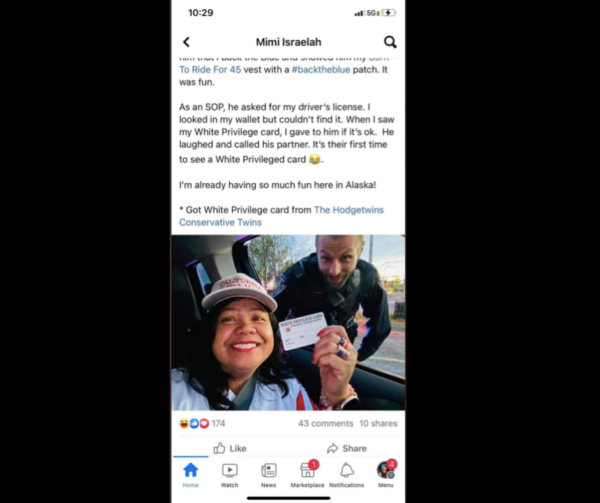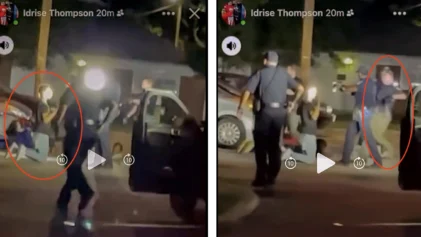Two officers in Alaska are in hot water with their local law enforcement after officials determined they violated departmental policy, during a recent traffic stop. The cops allowed a woman to continue driving despite not having a driver’s license after she flashed what some are calling a “white privilege card.”
On Thursday, July 7, Mimi Israelah was stopped by officers from the Anchorage Police Department for swerving in a car lane.
Anchorage police officers Nicholas Bowe and Charles Worland stopped Israelah at 3:37 a.m. She told them, allegedly, before they pulled her over, she was on her way to get pizza. The woman shared with the officers that she had traveled to a northwestern city to participate in a political rally for the former President Donald Trump that upcoming Saturday at the Alaska Airlines Center.
At this time, officers asked for her ID. When she could not locate it, the woman of Pinay or Filipina heritage, showed the officers a novelty “white privilege card” she purchased online.
The incident was made public and brought to the leaders in APD two days later when the woman made a Facebook post about the incident.

In the now-deleted post, she posted an us-ie with one of the cops, Officer Bowe, beaming as she held up a “white privilege card.”
Her post said, “As an SOP, he asked for my driver’s license. I looked in my wallet but couldn’t find it. When I saw my White Privilege card, I gave [it] to him [and asked] if it’s ok.”
“He laughed and called his partner. It’s their first time to see a White Privileged card,” she wrote. “I’m already having so much fun here in Alaska.”
After the post, the woman dripped in red, white, and blue paraphernalia (including rings) posted where she purchased the gag card, saying, “Got White Privileged card from The Hodgetwins Conservative Twins.”
In addition to the picture, she also made a video of the exchange, she is heard asking Bowe, “You like my white privilege card?”
Bowe smiles and says, “that’s hilarious,” before asking for her name.
Officers did not see any signs of intoxication or impairment, and ultimately let her go without a citation, despite the Anchorage municipal code requiring that all motorists carry their license on them at all times when operating a vehicle. In cases where a driver does not have a license on their person, there is a computer check service to determine if the person has a valid credential.
Both the post and video went viral, with people in the community pointing out the racial and bigoted overtones of the exchange — particularly the inside joke of “white privilege.”
Almost a week after the post went up, APD Chief Michael Kerle issued a broad statement on the department’s website about his commitment to serving all people and fighting discrimination.
He said he wanted “to personally address the community to provide some clarity regarding our internal standards of conduct” of police officers and staffers employed by the city under his watch.
“As law enforcement professionals, we are held accountable for our actions, and I am aware that the action of one officer can impact the trust between the police force and our community,” he wrote. “I know we are all human. But we belong to a profession that does not tolerate, practice, condone, facilitate, or collaborate with any form of discrimination. This profession requires our employees to treat everyone with respect and be culturally aware and competent.”
As a city, according to the most recent U.S. census data, white people make up over 61 percent of the population. People who identify as biracial or mixed make up 11 percent. Asians and people of Latin or Hispanic descent make up a little over 9 percent per racial classification. Indigenous Americans make up 7.5 percent, while Blacks total in around 5.3 percent. The only population below Blacks are people of Hawaiian or Pacific Islander.
Overwhelmingly, people of color are in the minority in the city, making the conversation of “white privilege” more poignant.
The Anchorage Daily News reports the incident was brought up during a Public Safety Committee meeting Wednesday, Aug. 3.
Deputy Chief Sean Case vaguely addressed his officers’ conduct but said the department needing further training on how to handle situations like is not out of the question.
Case said, “We recognize that the post, what was contained in that post, caused a bit of a public uproar, and there were a lot of people that saw that and did not like that post and had negative reactions to that — thought it was an inappropriate post — and we recognize that.”
The chief said an 11-day investigation was carried out, and during those two weeks both officers were placed on administrative leave. He would not share information regarding the internal investigation, which policies were violated, or if either Bowe or Worland faced any repercussions for their actions (or inactivity).
“The investigation regarding the incident is completed and is a part of confidential personnel files that will not be released publicly,” department spokeswoman Sunny Guerin wrote in a prepared statement for the press.
Guerin also wrote, “While this is not a citable offense, it is one of many indicators an officer uses as a possible sign of driving under the influence.”
Writing people up for small offenses like not having a physical license, is usually left up to the discretion of the officer, says Jeremy Conkling, the president of the police union and a sergeant with the department.
He said, “Especially in this circumstance, where you had a very, very low-level minor offense and the officers are really just focused on trying to find DUIs — I’m not at all surprised they didn’t write a citation. I don’t know that a lot of officers would have written that citation if any.”
However, some believe the focus should not be on the fact the woman did not have a license. The issue is the “hilarious” gag of the “white privilege” card, according to Celeste Hodge Growden, president of the Alaska Black Caucus.
She wondered did the woman not get a citation because of the gag, asking, “Is it because the white privilege card was effective?”
A local politician, Assemblymember Kevin Cross, said at the Public Safety Committee meeting, he did not believe “anything of malice or ill content was intended” by the officers, adding he was pleased with how the department handled the incident.
Cross said in defense of the one officer smiling to take a picture with the motorist, “Our public carry cameras everywhere, and they’re taking a snapshot of a moment in time, and we all understand how wildly inaccurate the public can be with information as given.”
“I commend them for taking 11 days to investigate this while this poor guy sat on administrative leave because somebody in the car had a stupid thing in their hands,” he continued. “The look on the officer’s face could have been like, ‘This is ridiculous,’ or ‘What is this?’ Sometimes you’re just kind of taken aback by the absurdity of human beings.”
But Growden said it was not just silly, but offensive.
“As a Black person, I was truly offended, and maybe some can’t understand that because they’re not a person of color, they’re not Black, but that was deeply offensive to members within our community and to some that are racially profiled by law enforcement. … I can’t understand why the officers found that humorous,” she said, as she is pushing the department to not only take accountability for how inappropriate the officers’ behavior was during the encounter — but also be transparent about how (and if) they were disciplined for the policy violation.
Case explained the department is undertaking sessions on diversity and inclusion.
“Those wheels are already in motion,” Case said. “It’s not a result of this particular situation — there is an ongoing need within the police department, not for any specific reason other than it’s part of our job to continuously provide training to our officers in anything that’s related to — whether it’s cultural diversity, whether it’s how to better communicate with the folks that we serve.”
Cherie Zajdzinski, a different spokesperson for the department, confirmed Bowe and Worland are still employed by the force.


